- europages
- >
- COMPANIES - SUPPLIERS - SERVICE PROVIDERS
- >
- mould components
Results for
Mould components - Import export

SPIROL
Germany
SPIROL manufactures several different styles of Post Mould Installed Compression Limiters for installation into the plastic component after the molding process is complete. Installing Compression Limiters after the plastic has cooled typically results in the lowest total installed cost since there is no added cycle time associated with placing the Compression Limiters over core pins during the moulding process. Post mould installed Compression Limiters also eliminate any concern with damaging the mould due to improperly positioned components. SPIROL Standard Post Mould Compression Limiters include: The Series CL220 Split Seam, Series CL200 Split Seam - Slim Profile, Series CL350 Split Seam - Heavy Wall, Series CL400 Split Seam - Oval, Series CL6000, CL6100 & CL620 Aluminium and Series CL8000 & CL8100 Brass.
Request for a quote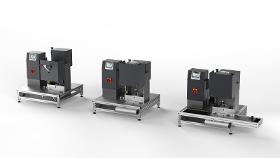
OPTIMEL SCHMELZGUSSTECHNIK GMBH
Germany
Special machines for the automotive and supplier industry Machine system for low pressure molding - electronics casting The BASEline series combines a compact design and convenient operation and can be used optimally for the majority of low pressure molding projects. Various mechanical components can be put together depending on requirements. The adapted melting device with double-acting piston pump, 4l tank volume and a melting capacity of approx. 1kg/h enables optimal processing of small to medium shot weights and/or quantities. The available clamping force of 9/12kN is suitable for casting surfaces up to approx. 3,000mm². By using the Siemens S7-1200 control with touch panel, the series offers the same ease of use as the larger series.
Request for a quote
SCHOCK GROUP
Germany
SCHOCK manufactures sophisticated plastic parts for the highest requirements with a modern machinery line consisting of injection molding machines, quick slide machines and multi-component injection molding machines
Request for a quote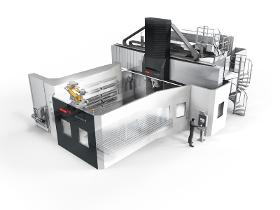
STARRAG GMBH
Germany
With the T/TF series, Droop+Rein offers gantry machining centres for heavyduty machining in many sectors Applications range from tool and mould making, aircraft component manufacturing and engine manufacturing to general mechanical engineering. Based on the robust, highly accurate and powerful basic machines, the T/TF series offers an extensive system of innovative automation and expansion stages that enable the machines to be adapted flexibly to each machining task. The optional automatically changing forktype milling head makes complex and demanding machining possible. Through extensive application knowhow, a variety of different milling heads are available including vertical milling heads, angle milling heads, and forktype milling heads for positional or simultaneously controlled applications.
Request for a quote
KUNSTSTOFFTECHNIK SCHMID GMBH & CO. KG
Germany
When plastic is not only supposed to have a shape but also meet the requirements, then you’ve come to the right place. Years of experience, reliability and uncompromising quality are strengths that set us apart from our competitors.
Request for a quoteDo you sell or make similar products?
Sign up to europages and have your products listed

KUNSTSTOFFTECHNIK SCHMID GMBH & CO. KG
Germany
Each project and each part is different. This is why the tools, injection moulding machines, peripheral components and automation need to be perfectly coordinated. We are your partner of choice – whether you are looking for an expert for complex turnkey requirements or production outsourcing.
Request for a quote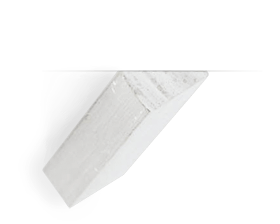
KORTE BAUTEILE GMBH
Germany
Profile type T3 flexible 1,000 x 16/23/28 mm (LxWxH) The flexible Drip Strip type T3 flexible is versatile and suitable for curved components. The moulding has three different length sides and can be glued on two sides.
Request for a quote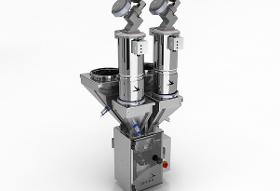
MOTAN-COLORTRONIC GMBH
Germany
ULTRABLEND medical is a gravimetric batch dosing and mixing station for plastic granules, additives, and regrind. It has been specially designed for pharmaceutical and medical technology applications. The high dosing accuracy and consistency of the ULTRABLEND improves end product quality and saves money by using less additives and reducing scrap. The ULTRABLEND is suitable for direct mounting on small injection moulding machines and extruders. All components are accurately dosed and weighed one after another into a weigh hopper. They are then passed to the mixing chamber where they are homogeneously mixed.
Request for a quote
SANHA GMBH & CO. KG
Germany
The piping system consists of high-quality NiroSan® SF press fittings with red moulded sealing rings made of FKM and NiroSan® stainless steel system pipes according to EN 10312. Specially made for all applications that require silicone free components. Silicone-free moulded sealing rings are ideally suited to applications such as varnishing and painting industries. All NiroSan® SF press fittings are made of the material 1.4404 / AISI 316L (for moulded fittings) and 1.4408 (for threaded fittings and stainless steel precision castings). The material contains a minimum of 2.3 % molybdenum and a lower carbon content than the conventional steel quality 316. Thereby these materials are not only of equal value but in addition, material 1.4404 / 316L stands out on account of its considerably higher corrosion resistance. Certified in accordance with all relevant national and European certification bodies.
Request for a quote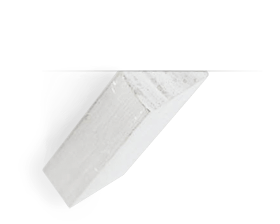
KORTE BAUTEILE GMBH
Germany
Profile type T3 rigid 1,000 x 16/23/28 mm (LxWxH) The most versatile Drip Strip type T3 rigid: Suitable for all standard applications. Can be used on straight components. The moulding has three different length sides and can be glued on all three sides.
Request for a quote
RÜHL FEUERLÖSCHMITTEL GMBH
Germany
GFK Systems PUR Systems Fire Extinguishing Agents Cleaning + Disinfection Infothek About us Contact Products Polyester Foam Resins Polyester Resins Applications Service Quality Newsletter Contact, Glass Fibre Reinforced Plastics Polyester Foam Resins Compared to conventional matrix systems for fibre-reinforced products, UP foam resins offer material and weight reductions of up to 30 % thanks to their micro-cellular foam structure. In simple sealed moulds, glass fibre reinforced plastic components that are smooth on both sides are produced cost-effectively under a vacuum in comparatively short cycle times. The production of sandwich components resistant to bending, with a foam core, and the direct integration of metal reinforcements and threaded elements – for example for large vehicle components – has also proven itself. Typical properties Dense matrix / composite of approximately 0.6–0.7 g/cm³ / 0.7–1.2 g/cm³ Fibre content 20-50% of total weight Moulded part mass per unit area of 3000–5000 g/m² Flexural modulus of elasticity 3000–8000 MPa Bending resistance of 35–185 MPa Impact resistance of 35–65 KJ/m² (with 20–35% glass content) Reinforcing materials: Continuous glass fibre mats Composite glass fibre and fleece mats Natural fibre mats Special formulations and versions Systems with long processing times for very large components Foam resin formulations with elevated dimensional stability under heat Systems for fibre-reinforced components with a high level of characteristics Coordination with gel coat / top coat for surface refinement Flame protection formulations Electrical industry: UL 94 V0 Rail vehicle construction: DIN 5510 (S4, SR1, ST2)
Request for a quote
RÜHL FEUERLÖSCHMITTEL GMBH
Germany
Flexible foams are elastic PU foams that are used in many different applications thanks to their usually excellent padding properties. In addition to the seating furniture industry, applications include motor vehicle and rail vehicle seats. However, they can also be used in seals and loaded damping components. Typical properties Moulded part density of 40–250 kg/m³ Adjustable compression load deflection Dimensional stability under heat up to 100°C Water is usually used as the foaming agent, but liquid CO2 is also possible Special formulations and versions Viscoelastic Barium sulphate loaded for acoustic applications, e.g. in aviation FIPFG seals for PU high-pressure processing Dimensional stability under heat up to 150°C in special applications Emission-free pursuant to RAL-ZU 38 Flame protection formulations Automotive: FMVSS 302 Rail vehicle construction: DIN 5510 (S3, SR2, ST2), EU TL 45545 Aircraft construction: ABD 0031, FAR 25.853 Furniture industry: California 117 Section A Part 1
Request for a quote
RÜHL FEUERLÖSCHMITTEL GMBH
Germany
PU composites are mainly found in the production of moulded parts resistant to bending. The skilful combination of materials puts the topic of lightweight construction into the spotlight (honeycomb technology applications). Sophisticated surface designs are supported by corresponding PU / UP resin systems. Thanks to the reduced component weight, moulded part applications are used in the automotive sector – and, with corresponding flame protection formulations, also in rail vehicle construction. Typical properties Moulded part density of 450–1100 kg/m³ Fibre proportion from 30 % Available foaming agents: usually water Reinforcing materials Glass fibre rovings Glass fibre mats and non-crimp glass fibre fabrics Carbon fibres Natural fibres (hemp, sisal, coconut etc.) Special formulations and versions Honeycomb materials for sandwich structure components Paper honeycombs Waterproof paper honeycombs (patent-pending process) Plastic honeycombs Aluminium honeycombs Systems with a large processing window Use of polyols based on renewable resources Self-parting with simultaneous good lamination properties Flame protection formulations Automotive: FMVSS 302 Rail vehicle construction: DIN 5510 (S4, SR2, ST2) Aircraft construction: FAR 25853, ABD 0031 Construction industry: DIN 4102 B2
Request for a quote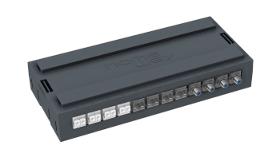
FRIEDENSTAB KUNSTSTOFFTECHNIK GMBH
Germany
With a modern machine park, we are able to produce injection molded parts up to approx. 400 grams. The materials used for this are e.g. PS, ABS, PP and PE, but also technical plastics. With a modern machine park, we are able to produce injection molded parts up to approx. 400 grams. The materials used for this are e.g. PS, ABS, PP and PE, but also technical plastics such as PA6, POM or IXEF are often used. Brief overview ARBURG injection molding machines Component weight: approx. 2 - 400 grams Closing forces: 50 - 220 tons Hybrid components (insert / outsert technology) Removal robots / vacuum gripping systems Automation around the injection molding process Central material handling system Material preparation Material drying
Request for a quoteResults for
Mould components - Import exportNumber of results
15 ProductsCountries
Company type
Category
- Cutting - steels and metals (1)
- Cutting, plastics - machinery (1)
- Machine tools, metal machining - parts and accessories (1)
- Moulds and patterns (1)
- Pipe and tube fittings - ferrous metal (1)
- Plastics - machines and material for industry (1)
- Potting equipment (1)
- Screw cutting - steels and metals (1)